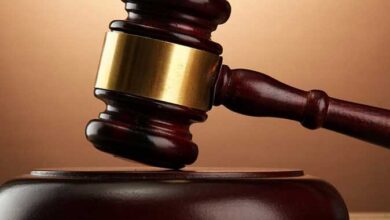Wrap-up of Thursday's session:
On Thursday, the fifth session of Mubarak's trial saw witnesses accuse the former minister of interior of ordering the shooting of protesters. Police Commander Essam Shawky, the eighth witness, told Judge Ahmed Refaat that Adly ordered to quell the anti-government protests this year by 'any means,' state television reported. Shawky, who served in the anti-riot police during the popular uprising against Mubarak, presented to the court a CD that he said contained scenes showing police firing on demonstrators. The ninth witness, Police General Hassan Abdel Hameed, confirmed Shawky's testimony. He told the court that he attended a meeting on 27 January in which Adly ordered implementation of "Plan 100," a secret plan whereby police would deter protestors from reaching Tahrir Square by any and all means.
"[The eighth witness] has dropped a bombshell," said Mohamed Zarea, a lawyer representing 500 injured and martyrs, arguing that his testimony proves that Adly was involved in the killing of protesters. Zarea told Al-Masry Al-Youm in a phone interview that Shawky's testimony proves that Adly instigated "all illegal practices that occurred during the revolution," added Zarea. "By the same token, Mubarak, who authorized Adly to crush the demonstrations, should be held responsible for what happened," said Zarea. In the session, Adly’s lawyer attempted to undermine the credibility of prosecution witness General Abdel Hameed, saying he has documentation of a dispute between Adly and Hameed.
In the following session, scheduled for Sunday, Field Marshall Hussein Tantawi is due to testify in a closed session. "The appearance of Tantawi, Anan, Soliman, a former interior minister and the incumbent minister proves that it is a serious trial and not a play," said Zarea who added that "The testimonies of Tantawi will be critical." On May, Tantawi said during the graduation ceremony at the Police Academy that the Armed Forces had refused to open fire on protesters. If Tantawi tells the court that he was asked to mobilize the armed forces to crush the protests,” this will imply that that the same request was addressed to the Interior Ministry earlier," Zarea added. "I think [Tantawi's] testimony will prove that Mubarak was involved and aware of the killing of protesters," he added.
4:42 pm: State TV broadcasts Mubarak being wheeled out of Police Academy on his gurney.
4:38 pm: Court adjourns until Sunday.
3:56 pm: Former Interior Minister Habib al-Adly’s lawyer attempts to undermine the credibility of prosecution witness General Hassan Abdel Hameed, saying he has documentation of a dispute between Adly and Hameed, according to state TV.
3:48 pm: Court is in recess.
2:41 pm: A group of people are chanting against the police outside the academy while whacking a poster of Mubarak with their shoes, Al-Masry Al-Youm's correspondent reports.
2:40 pm: Al Jazeera reports Abdel Hameed as saying "Plan 100" includes shooting at protesters and securing Gamal Mubarak's transportation despite the earlier state TV report that he knows nothing about the plan.
2:28 pm: State TV quotes Abdel Hameed, the ninth witness, as saying "'Plan 100' is a secret plan for Central Security Forces and I don't know it."
2:20 pm: More than 10 Facebook pages have cropped up saluting Police Commander Essam Shawky, who testified today saying that Adly ordered protesters killed.
2:05 pm: More security forces are arriving outside the court, according to Al-Masry Al Youm's correspondent.
2:00 pm: General Hassan Abdel Hameed tells the court that, during a meeting with top police officials on 27 January at 1:30 pm, Adly discussed "Plan 100." Hameed says the plan authorized police to block Tahrir Square entrances and use any means to prevent protester numbers from reaching 1 million. Abdel Hameed says that Ahmed Ramzy, former assistant minister for Central Security Forces, said at the time that his forces could apply something stricter than "Plan 100."
Abdel Hameed claims he objected to the plan, and Adly responded by transferring him to another post to "learn how to disperse protesters." Abdel Hameed also testifies Adly told his aides during the meeting that he would order internet and phone service cut.
1:30 pm: Police Commander Essam Shawky, the prosecution's eighth witness, has informed the court that General Hassan Abdel Hameed attended a meeting at the Ministry of Interior with Adly and his aides on 27 January. Shawky said Abdel Hameed, who is testifying before the court, told him that Adly ordered his aides to use any means necessary to disperse protesters, state TV reports.
1:13 pm: Head Judge Ahmed Refaat listens to the prosecution's ninth witness General Hameed.
1:10 pm: When asked if he had a comment about Police Commander Essam Shawky's testimony, Mubarak told the judge that he has no comment. Adly told the judge that the testimony was completely incorrect, state TV reports.
1:07 pm: The trial reconvened a few minutes ago, state TV reports.
1:00 pm: Anti-Mubarak protesters burn his photo while chanting "Allah Akbar" (God is great).
12:30 pm: Protesters outside the Police Academy are chanting against Egypt's military rulers, Mubarak and Adly.
12:17 pm: State TV reports court in recess.
11:15 am: Police Commander Essam Shawky: I warned the public prosecutor to seize all Central Security Forces records before they could be damaged.
11:12 am: Adly ordered internet and the phone service cut, according to Shawky.
11:08 am: Shawky: Adly ordered police officers to support Central Security Forces and ordered them armed with automatic weapons. He also gave orders to hide police vehicles inside the Police Academy.
10:52 am: Shawky says he told the public prosecutor during questioning that former Interior Minister Habib al-Adly and his aides ordered the killing of protesters. He also says Adly ordered protesters dispersed by any means.
10:45 am: Head Judge Ahmed Refaat calls the prosecution's eighth witness, Police Commander Essam Shawky, to the stand.
10:40 am: State TV reports that the trial has started.
10:13 am: A small group of martyrs' relatives are outside the Police Academy. Pro-Mubarak protesters have not yet appeared, according to Al-Masry Al-Youm's correspondent.
“It’s obvious. They are playing with the people. The prosecution witnesses changed their testimonies. This is a charade,” Abdel Karim Ibrahim, whose brother Moustafa Ibrahim was on 28 January, told Al-Masry Al-Youm.
10:08 am: State TV broadcasts footage of the ambulance carrying Mubarak arriving outside the Police Academy guarded by armed and masked army officers. A hospital bed is brought to a room where the former president is waiting to take him into the courtroom.
9:55 am: A plane carrying Mubarak arrives at the Police Academy from the International Medical Center, where the former president is being hospitalized between court sessions.
9:25 am: A small crowd is gathering outside the Police Academy. Eyewitnesses say they are mainly anti-Mubarak protesters; their numbers are much smaller than during previous sessions. Rumors are circulating that a number of ardent football fans, known as the Ahlawy Ultras, may join the crowd to protest what they perceive as police brutality. Central Security forces chased Ahly fans outside the Cairo Stadium for chanting slogans against Mubarak and Adly during a match Tuesday.
8:15 am: State TV reports that former Interior Minister Habib al-Adly and his six aides, along with Mubarak's sons, have arrived at the Police Academy.
7:00 am: The fifth session of the trial of former President Hosni Mubarak convenes Thursday morning.
Summary of the fourth session, Wednesday 7 September: The court agreed to summon Field Marshal Mohamed Hussein Tantawi, Mubarak's defense minister for 20 years and now leader of ruling military council, to testify on 11 September. Judge Ahmed Refaat also summoned other top officials including Armed Forces Chief of Staff Samy Anan, former Intelligence Chief and, briefly, Vice President Omar Suleiman and Interior Minister Mansour el-Essawy.
Police witnesses called by the prosecution this week have suggested that neither Mubarak nor his former Interior Minister, Habib al-Adly, gave security forces orders to shoot protesters. Two witnesses said they were told to show "self restraint."



